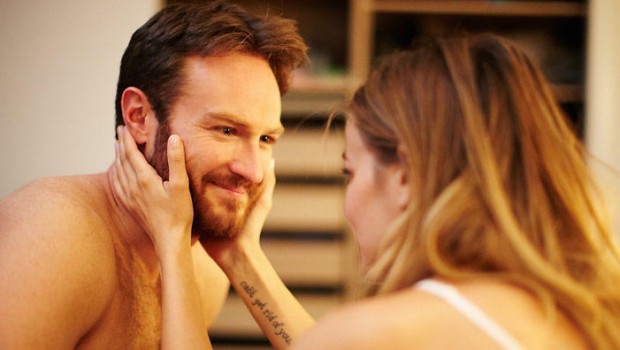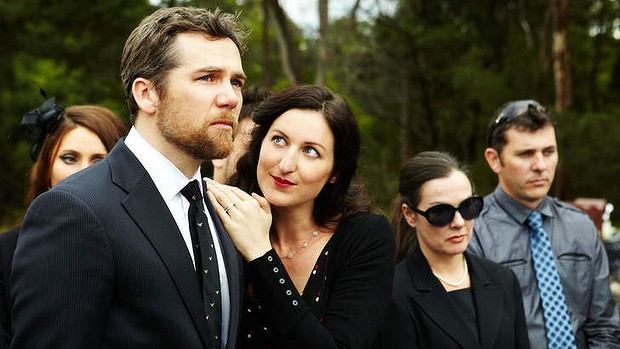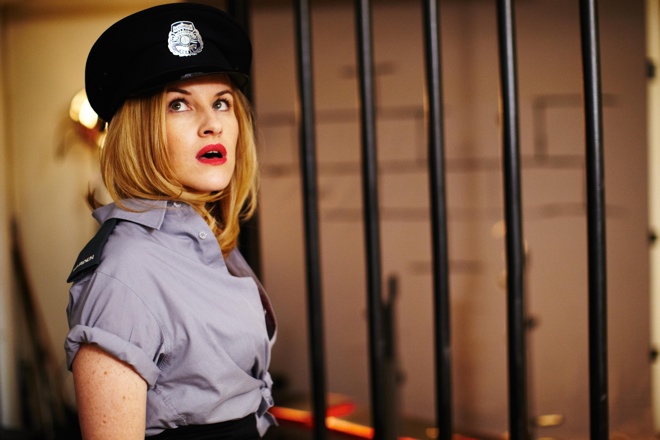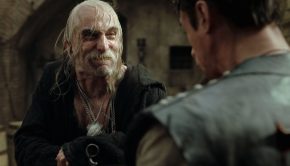The Little Death – Film Review
Reviewed by Damien Straker on September 17th, 2014
eOne Films presents a film by Josh Lawson
Written by Josh Lawson
Produced by: Jamie Hilton, Michael Petroni and Matt Reeder
Starring: Josh Lawson, Bojana Novakovic, Damon Herriman, Kate Mulvany, Kate Box, Patrick Brammall, Alan Dukes, Lisa McCune, Erin James, TJ Power and Lachy Hulme
Music by Michael Yezerski
Cinematography: Simon Chapman
Editing by Christian Gazal
Running Time: 97 minutes
Rating: MA15+
Release Date: September 25th, 2014
Josh Lawson, the writer and director of The Little Death, believes sex shouldn’t be taken too seriously because it is a part of everyday life and a normal function of the human body. His assessment of sex is apt but his directional debut, the title of which refers to the French term “La Petite mort” a euphemism for an orgasm, struggles between commercialism and truthfulness. His film depicts the sexual fetishes of several Australian couples but the humour is geared towards people’s foolishness mainly prior to sex, which is an artistic and political compromise. There is some sex but it’s not really about that. The comedy in the script favours absurd situations and implausible character choices rather than confronting the frankness of sex, which is how it should be treated on screen. Similarly, the film appears coy about showing skin. On the Australian Classification Board the film is rated MA15+ with sex and language rated as having “strong impact”. Yet the nudity is labelled as having “mild impact”. Instead, the film relies mostly on verbal exchanges for its comedy and its sexual content and while it is very explicit it is only sporadically funny. Perhaps these concessions were installed due to the uncertainty of how Australian films perform at the box office.
There are five stories, each named after a paraphilia and loosely strung together by a man who introduces himself as a sex offender. The latter is a strange inclusion given the character has no bearing on the narrative till the end. Fewer stories might have helped the film be funnier and focussed in its thematic meaning. With the threads interrupting each other, the film obtains a fragmented structure, like several television episodes edited together. The first episode is titled “Sexual Masochism”. Paul (Lawson) is asked by his girlfriend Maeve (Bojana Novakovic) if he will rape her. Even verbally, this is confronting and casts uncomfortable tension over the film. The only way Lawson sees this potentially disturbing material being resolved is with a ludicrous, farfetched sequence that is tonally unstable and too implausible to be funny. A second thread is equally troubled by the darkness of its subject matter. It is titled “Dacryphilia” meaning having sexual pleasure in seeing someone cry. Rowena (Kate Box) and Richard (Patrick Brammall) are trying for a baby but learn Richard’s father has died. Richard’s sadness makes their sex more satisfying, so Rowena decides to secretly be mean by hiding his dog and lying to him. The story isn’t about sex but about finding bigger lies for Rowena to tell, which become increasingly unlikely.
The next two threads aren’t about the physicality of sex either. “Role Play Fetishism” features Evie (Kate Mulvany) and Dan (Damon Herriman) dressing up as a patient and doctor to enhance their desires. The twist is Dan prefers this life to his normal one and takes it too seriously, by diagnosing his wife with a real disease. There is a nice line where he says his old self is dead because he prefers his reinvented persona but the angle of his self-discovery as an actor and rejuvenation means the characters are less attracted to each other and the thread becomes distanced from the subject of sexuality. Another story involves “Somnophilia” meaning sexual arousal from watching a person sleep. Phil (Alan Dukes) stays awake to watch his wife Maureen (Lisa McCune) sleep because he can’t stand her when she’s awake. When she takes Phil’s sleeping pills by accident he discovers he loves his wife more when he can touch her face and dress her in clothes he’s bought. The character of Maureen isn’t kindly represented and the thread is resolved with a melodramatic coincidence, which removes itself from anything involving sexuality. I think the Australian film Sleeping Beauty is a weirder and more detailed look at somnophilia and voyeurism.
The fifth chapter seems disconnected from the rest of the film because unlike the other episodes it is rarely intercut. It is named “Telephone Scatalogia”, sexual arousal from phone calls from strangers. A deaf man named Sam (TJ Power) rings a call service that translates calls through a web cam and he asks Monica (Erin James) on a slow night if she can translate a sex hotline. She interprets the call between Sam and the woman on the other end of the phone. It’s not an unlikeable sequence, it is a unique setup, but the sex is expressed only in words and it is questionable about how the story fits given the film’s focus primarily on suburban couples. Thematically, maybe each thread is about people adopting more difficult roles than necessary to impress their partners before sex. Yet from the film’s perspective, the foolishness of the characters and the humour employed sidesteps the physicality and the confronting nature of sex on the screen. On top of Sleeping Beauty, Little Children is another feature that Lawson looks to have taken inspiration from but it had fewer compromises. Meanwhile, the construction of The Little Death would have benefited from fewer threads and less fragmentation, which only slows the pacing down and doesn’t allow the laughs to arrive as consistently as we might expect.
Summary: The film relies mostly on verbal exchanges for its comedy and its sexual content and while it is very explicit it is only sporadically funny.










